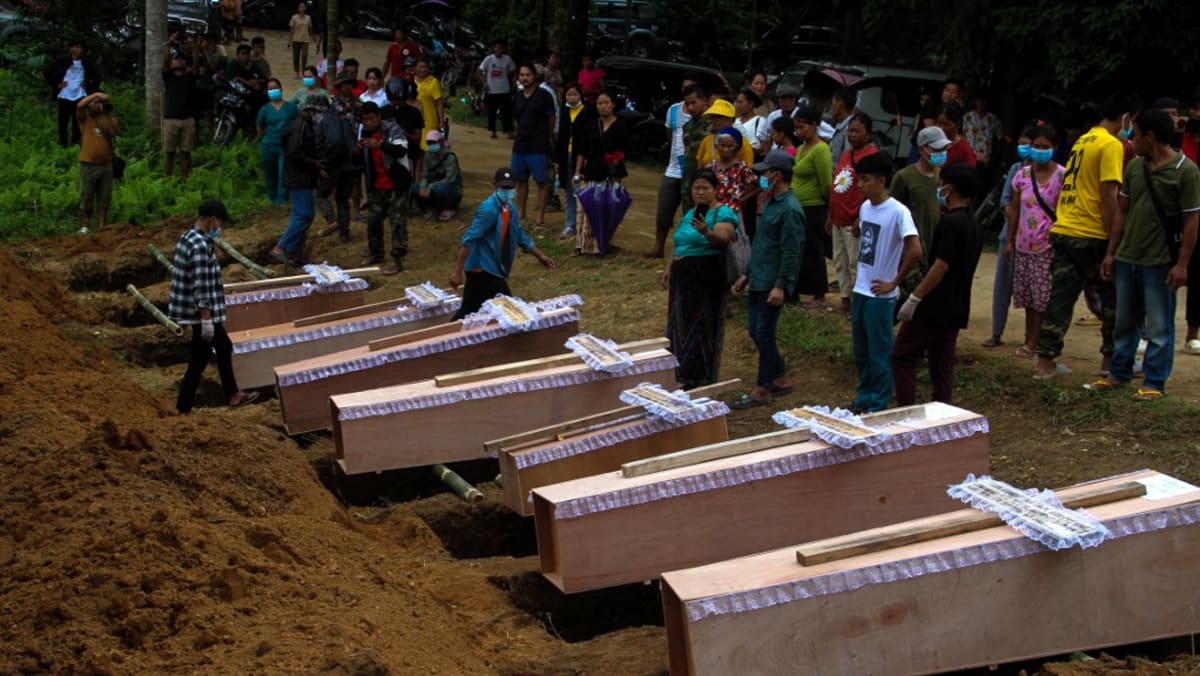SINGAPORE: The terms “violence” and “terror” are often used interchangeably in the Myanmar language အကြမ်းဖက်မှု (transliteration: aa kyam hpaat mhu). Both sides of the political divide have labelled the other as terrorists since the February 2021 coup.
In May 2021, the State Administration Council (SAC) military regime designated the guerrilla People’s Defence Force (PDF) groups as terrorists, invoking the 2014 counterterrorism law and accusing them of carrying out acts of violence and intimidation.
In March 2021, the Committee Representing Pyidaungsu Hluttaw representing elected lawmakers ousted by the coup declared the SAC as a “terrorist group”. In September 2021, the parallel National Unity Government (NUG) announced a “people’s defensive war” in response to the military’s violence against protestors, referring to the SAC as terrorists.
The spiralling violence in Myanmar was a main concern of Association of Southeast Asian Nations (ASEAN) leaders when they invited SAC Chief Senior General Min Aung Hlaing to Jakarta in April 2021 to discuss and agree on the Five-Point Consensus to return peace and stability to Myanmar. Min Aung Hlaing agreed to the Five-Point Consensus, which prioritised the “immediate cessation of violence”.
Yet, nearly three years after the coup, SAC forces have continued and even escalated their violence with airstrikes, arson, arrests, lootings and killings. The SAC’s agenda to “crush the opposition”, including those suspected of supporting PDFs, has sparked retaliatory actions by local PDFs and resistance groups against military sympathisers.
NO END IN SIGHT
The international community often views the situation in Myanmar as a civil war between opposing political factions. A 2021 Chinese foreign ministry statement, for instance, contains no mention of the Myanmar people’s aspirations.
Large swathes of Myanmar’s population, however, view the sustained and, in some parts of the country, strong resistance to military rule as a national uprising. In many urban and rural areas, peaceful protests against the military regime persist in various forms.
The NUG’s Ministry of Defence estimates that about 259 PDF units have been established nationwide, operating in 250 township-based units, and there are more than 400 urban guerrilla forces. Though the NUG’s Ministry of Defence tries to enforce a code of conduct for PDF personnel, many local PDFs occasionally deviate from those instructions.
Some ethnic resistance organisations perceive the NUG and its PDFs more as fellow partners in resistance against the central government (or in this case the SAC) than as their coalition leader. Intra-ethnic resistance organisation conflicts have caused unintended civilian casualties, making it difficult for the NUG to manage the discrete resistance forces. Without an effective chain of command, the NUG essentially lacks the capacity to enforce its principles regarding the treatment of “dalan” (informants) or its code of conduct for armed resistance personnel.
However, the SAC also seems unable to maintain an effective chain of command, despite offering incentives to troops such as promises of promotion and allowing the looting of villages. Accounts of defection, desertion, and minor mutinies indicate the SAC’s inability to exert complete control over its security forces.
While the NUG claims that more than 13,000 soldiers and police officers have defected since the coup’s onset, it is worth noting that desertion rates have historically been high in the Myanmar military. During a period of more effective military control, in 2005, one military region alone saw 4,701 deserters but military defections seem to have slowed since 2022.
Related:
Commentary: In a meaningless gesture, Myanmar junta cuts Aung San Suu Kyi’s sentence
Commentary: Another failed attempt to address Myanmar conflict – what’s next?
BATTLE OF ENDURANCE
After two years of almost continuous fighting with no substantial reserve units for rotation, signs of strain are beginning to emerge in the SAC’s forces. Some soldiers have refused outright to engage in combat.
According to one defector in September 2022, the entire Light Infantry Battalion 102 refused to fight and returned their weapons to their field commander. In a separate report from April 2023, the commander of the Southeastern regional command was relieved of his position following heavy casualties among his troops and their refusal to continue fighting.
This malaise is not just occurring within SAC troops. In June 2023, a Border Guard Force allied to the SAC defected to the NUG. Though no similar defections have taken place since, these incidents might indicate the SAC’s eroding ability to maintain an effective chain of command. However, the SAC’s decades-old institutional machinery, extensive experience, and harsh control measures still give it more influence over its troops compared to the NUG.
In Myanmar now, the people cope with violence and terror daily. The SAC’s attempts to play the Aung San Suu Kyi card by inviting then Thai foreign minister and deputy prime minister Don Pramudwinai to meet her in August 2023 provoked a virulent response.
One viral social media post expressed that the youth will persist in resisting SAC rule, regardless of whether Aung San Suu Kyi is released or engages in dialogue with SAC. The NUG’s Foreign Minister’s reference to “our people’s interests” in discussing the Don-Suu meeting signifies an awareness that the public will not be easily swayed by the political elites’ superficial efforts to shape outcomes.
Elites on both sides of the political divide in Myanmar have limited influence and are struggling to maintain control over their respective supporters and armed sections. Any outcome of the current battle of endurance hinges on their capacity to solidify the chain of command, as the conflict wears on with no end in sight. With such capacity lacking on both sides, the innocents and civilians will bear the brunt of these turbulent waves of violence.
Thida is currently a Visiting Fellow with the Myanmar Studies Programme at ISEAS – Yusof Ishak Institute, while Kyi Sin is a Research Officer at the same institute. This commentary first appeared on the Institute’s blog, Fulcrum.




